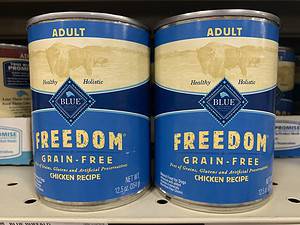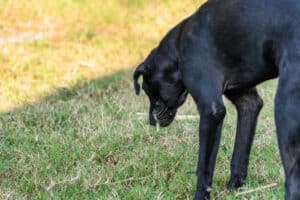Do you worry that your furry friend has a dry nose? Dogs may develop dry noses for many different reasons, but there’s no need to panic. This article will discuss the three most common reasons your dog’s nose is dry and what you should do about it.
What Influences A Dog’s Health?
Diet
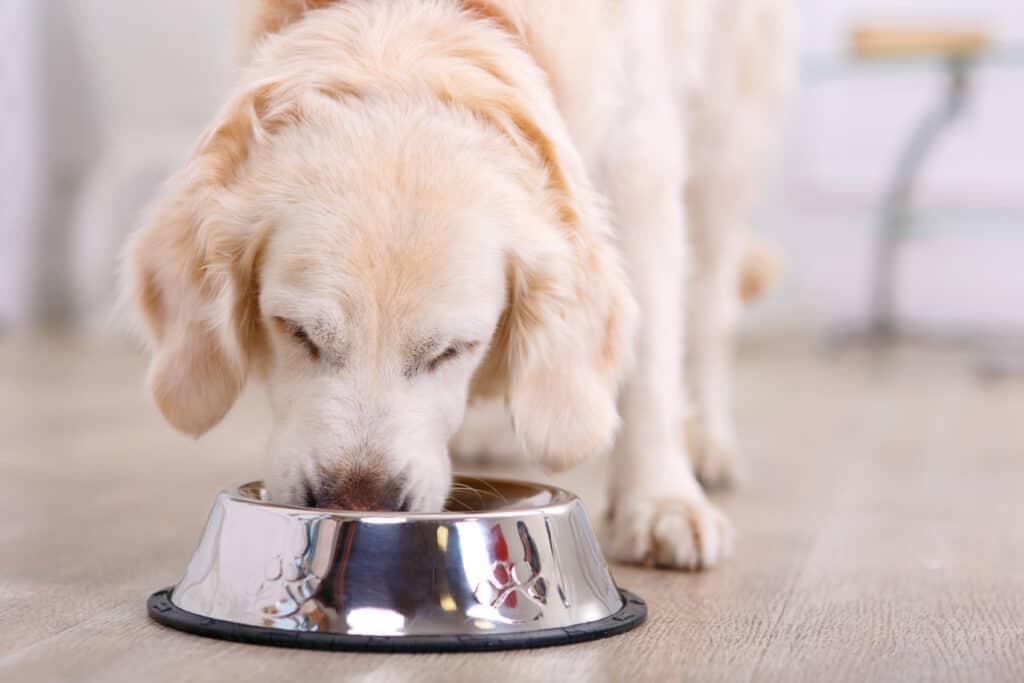
A dog’s diet has a major influence on its health.
©Dmytro Zinkevych/Shutterstock.com
A dog’s diet plays a critical role in determining its overall health and well-being. Just as with humans, the food a dog consumes directly impacts its physical and mental health. A balanced and nutritious diet is essential to maintain a dog’s ideal body weight, muscle mass, and energy levels. The right combination of proteins, carbohydrates, fats, vitamins, and minerals is necessary for proper growth and development, as well as for supporting the immune system and promoting healthy organ function. Conversely, an inadequate or poor-quality diet can lead to various health issues in dogs, such as obesity, malnutrition, digestive problems, and even a weakened immune system.
Exercise
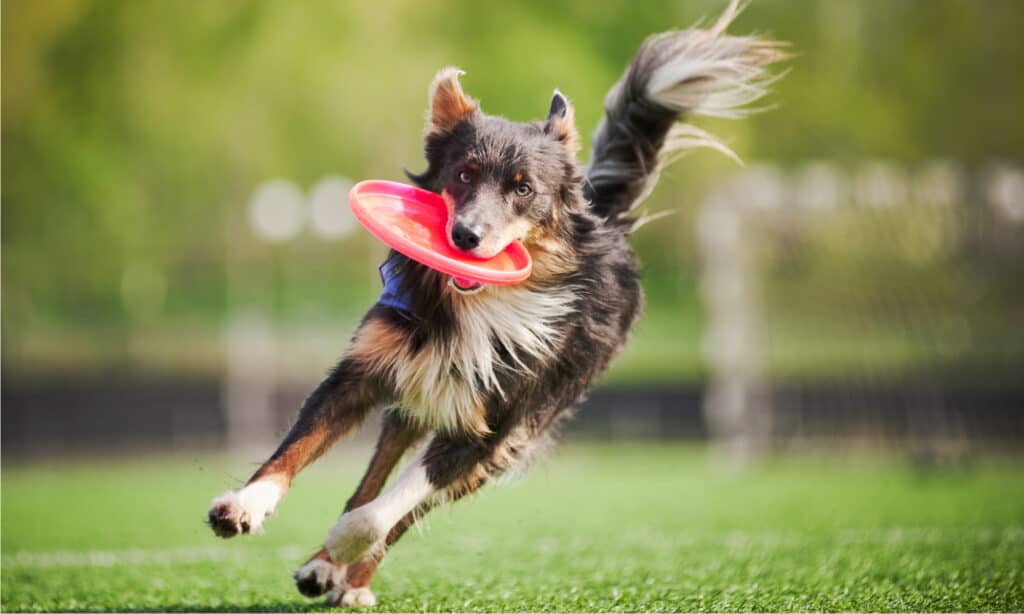
Frisbee catching provides an excellent source of exercise for energetic dog breeds.
©Ksenia Raykova/Shutterstock.com
Exercise is incredibly important to a dog’s health. It helps dogs maintain a healthy weight, preventing obesity and related health problems. It also strengthens their muscles and joints, improving mobility and reducing the risk of injuries. Moreover, exercise is essential for mental stimulation, reducing stress, anxiety, and destructive behavior that can result from pent-up energy. Beyond the physical benefits, it fosters socialization, encourages positive behavior, and deepens the bond between dogs and their owners.
Bathing
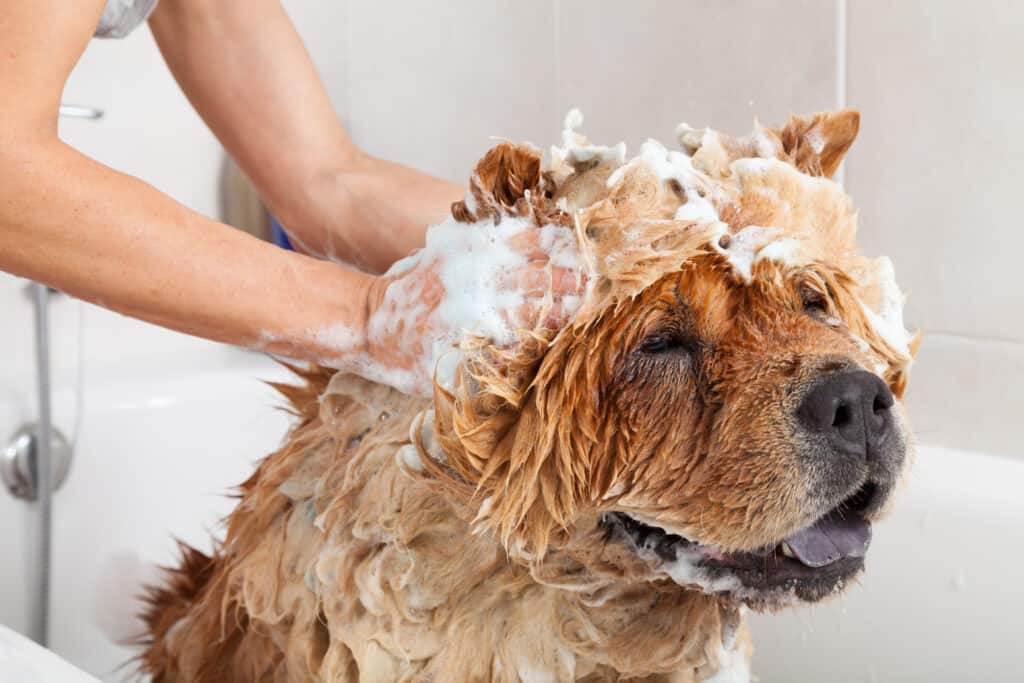
Frequent baths are crucial to a dog’s dermatological health.
©iStock.com/fotoedu
Bathing and grooming are essential components of a dog’s wellbeing. Firstly, grooming helps to prevent various health issues. Brushing removes dirt, debris, and loose fur, reducing the risk of matting and skin infections. It also allows for the early detection of ticks, fleas, or any unusual lumps or bumps. Washing up frequently, on the other hand, eliminates dirt and allergens that can cause skin irritation and itching.
Furthermore, grooming promotes good circulation and distributes natural oils throughout a dog’s coat, resulting in healthier and shinier fur. It also aids in maintaining proper body temperature regulation and reduces the risk of overheating or getting too cold.
Why Do Dogs Have Wet Noses?
Sense of Smell
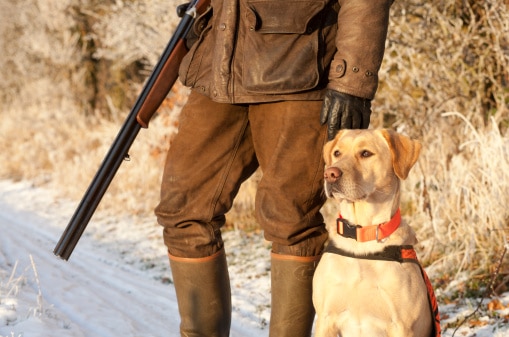
Dogs, with their keen senses of smell, have helped humans hunt for millennia.
©juliazara/ via Getty Images
Dogs possess wet noses for a variety of crucial reasons, and this unique feature serves several important functions in their lives. Firstly, a wet nose significantly enhances a dog’s extraordinary sense of smell. Dogs have famously keen olfactory abilities, and the moisture on their nose plays a crucial role in this regard. It helps trap and dissolve scent molecules from the environment, making it easier for dogs to detect and follow scents. This heightened sense of smell is essential for various purposes, including hunting, tracking, and even search and rescue operations where dogs can locate missing individuals by following their scent trails.
Thermoregulation
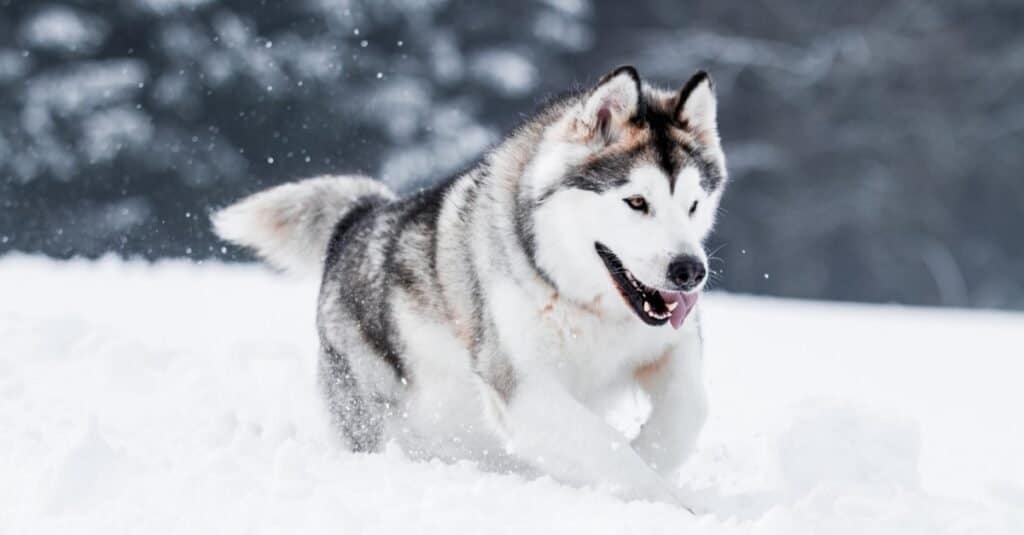
Alaskan malamutes are sometimes used as sled dogs in below-freezing temperatures.
©Aneta Jungerova/Shutterstock.com
Moreover, a dog’s wet nose contributes to thermoregulation. In hot weather, dogs may lick their noses, and as the moisture evaporates, it cools their nasal passages, aiding in temperature control. Conversely, in cold weather, a moist nose can help retain heat, preventing it from freezing and ensuring the dog’s nasal tissues remain functional even in adverse conditions. This versatile feature allows dogs to adapt to a range of environmental conditions and maintain their comfort and health.
Communication
Additionally, a dog’s wet nose serves as a communication tool. The moisture on their nose can capture and convey chemical signals known as pheromones. These chemical signals convey information about a dog’s emotional state, health, and even reproductive status to other dogs. It’s a subtle but effective means of canine communication, allowing dogs to exchange important information without vocalizing.
3 Reasons Your Dog’s Nose is Dry
While the level of moisture on a dog’s nose can vary among individual dogs and change throughout the day based on factors like hydration and activity level, it’s important to note that a dry nose is not necessarily a sign of illness on its own. However, if you observe a dry nose in conjunction with other concerning symptoms or behavioral changes in your dog, it is always advisable to consult with a veterinarian for a thorough evaluation and appropriate guidance. Here are the three most common reasons your dog’s nose is dry.
#1 Dehydration
Dehydration can have significant consequences for a dog’s health, and one visible sign of dehydration in dogs is a dry nose. When a dog becomes dehydrated, it means that their body is losing more fluids than it is taking in, and this can lead to a decrease in the moisture level of their nose.
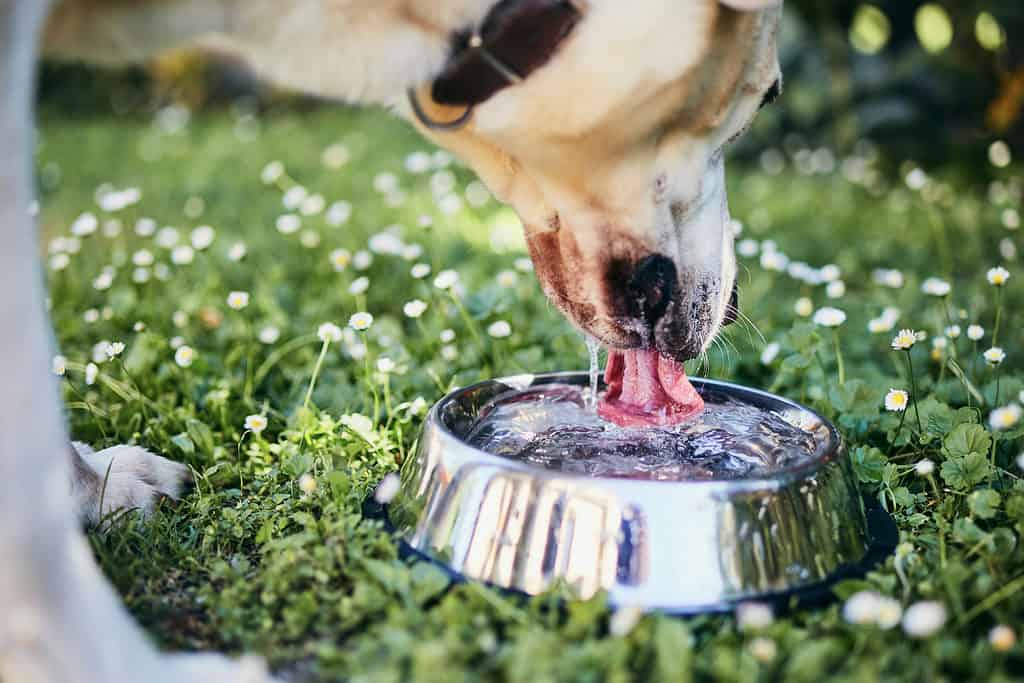
If a dog is not drinking sufficient water, heat and exercise may cause dehydration.
©Jaromir Chalabala/Shutterstock.com
Dehydration affects a dog’s entire body, including its mucous membranes and skin. As the body struggles to maintain essential functions, it prioritizes conserving fluids for vital organs. Consequently, less moisture is available for non-essential areas like the nose. The result is often a dry, warm, and cracked nose, which can feel noticeably different to the touch.
A dry nose in a dog can be an early warning sign of dehydration, and it’s essential for pet owners to recognize this symptom promptly. Dehydration in dogs can result from various factors, including insufficient water intake, excessive heat, illness, or physical exertion. Prolonged dehydration can lead to more severe health problems, such as organ dysfunction and heatstroke, so it’s crucial to address it promptly.
Treatment
To prevent and alleviate dehydration, ensure your dog has constant access to clean, fresh water. In hot weather or during vigorous activities, increase their water intake to compensate for fluid loss through panting and sweating from their paw pads. Additionally, monitor your dog for other signs of dehydration, such as lethargy, sunken eyes, loss of appetite, and dark yellow urine. If you suspect your dog is dehydrated or if it exhibits multiple symptoms, consult with a veterinarian immediately for a proper diagnosis and treatment plan, which may include rehydration through intravenous fluids. A hydrated dog not only has a healthier nose but is also more likely to enjoy better overall well-being.
#2 Sunburn
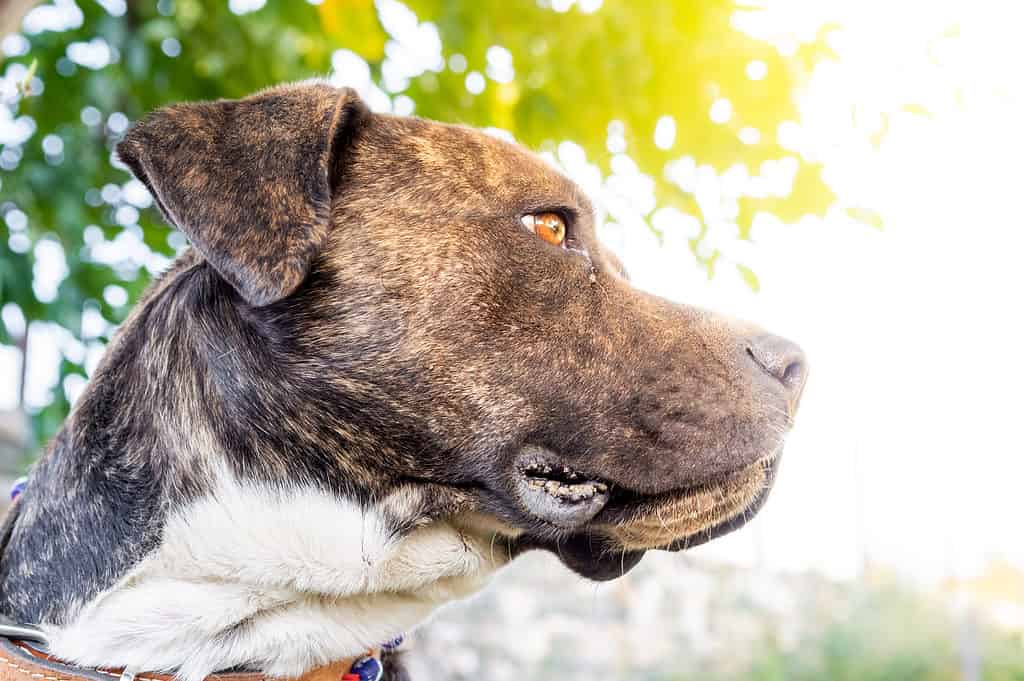
If exposed to excessive sunlight, dogs can develop sunburns on their noses.
©Ipek Morel/Shutterstock.com
Sunburn can have adverse effects on a dog’s nose, leading to dryness and potential discomfort, much like it can in humans. While many people are aware of the importance of protecting their skin from the sun’s harmful ultraviolet (UV) rays, it’s crucial to remember that dogs are susceptible to sunburn as well. This vulnerability is especially pronounced in dogs with lighter fur, thin or sparsely-haired noses, or those with pink or lightly pigmented noses.
A dog’s skin, including that on its nose, is vulnerable to sun damage. The nose lacks the protective fur covering other parts of the body. When exposed to intense sunlight, the UV radiation can strip away the natural oils in the skin, leading to dehydration and flakiness. Over time, this can result in the nose becoming dry and potentially cracked, which can be uncomfortable and painful for the dog.
This discomfort may manifest in various ways, such as the dog pawing at its nose, rubbing it against surfaces, or displaying signs of irritation and restlessness. The pain and discomfort associated with sunburned noses can disrupt the dog’s normal routines and activities, making it essential to address the issue promptly. Furthermore, repeated sun exposure without adequate protection can lead to chronic skin damage in dogs, potentially increasing the risk of skin cancer.
Treatment
If you suspect your dog has developed a sunburned nose, consult your veterinarian for guidance on appropriate treatment and skincare products. Protecting your dog from sunburn not only helps maintain a moist and healthy nose but also safeguards its overall skin health and well-being, reducing the risk of more severe issues in the long run.
#3 Allergies
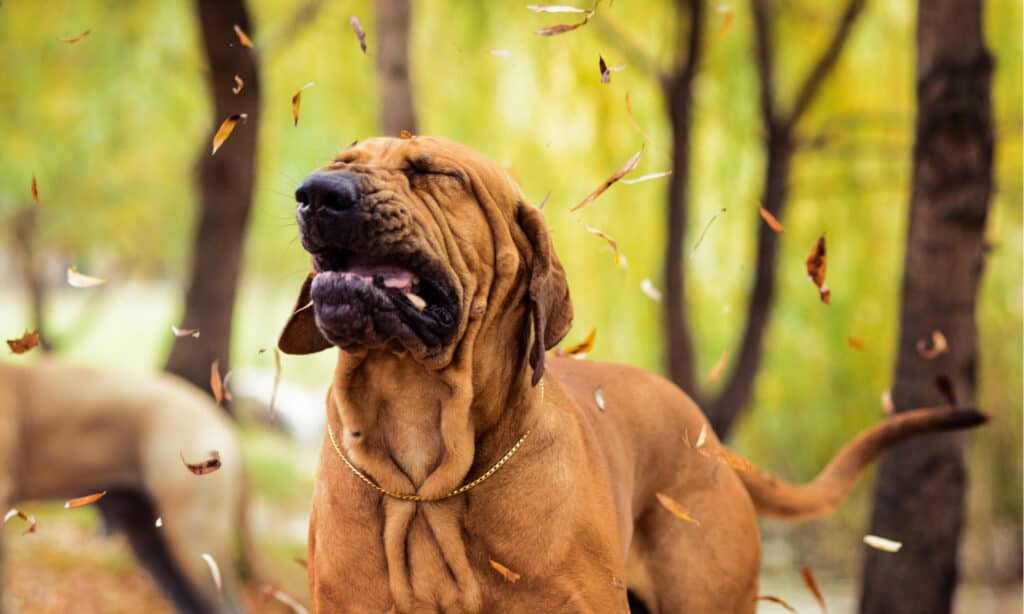
Like humans, dogs can have allergic reactions to many different types of allergens.
©olgagorovenko/Shutterstock.com
Allergies can significantly impact a dog’s health, and one of the potential effects of allergies in dogs is the development of a dry nose. Much like allergies affect humans, they can affect our canine companions as well. Allergies occur when a dog’s immune system reacts to certain substances as if they were harmful invaders. Common allergens for dogs include pollen, dust mites, certain foods, and even insect bites. When a dog is exposed to these allergens, it can trigger various allergic reactions throughout their body.
Skin sensitivity is a common manifestation of allergies in dogs. Allergic reactions can lead to dryness, itching, and inflammation of the skin. This skin sensitivity can extend to areas with thinner skin, such as the nose. The constant itching and irritation may compel dogs to rub or lick their noses excessively. Over time, this can strip away the natural moisture, resulting in a dry and potentially cracked nose.
Furthermore, allergic reactions can have secondary effects on a dog’s skin. Dermatitis, hot spots, and other skin issues can arise because of allergies. These conditions may require medical treatment or topical applications, and some of these treatments can inadvertently contribute to dryness on the nose, as they may contain ingredients that affect the delicate moisture balance of the skin.
Food allergies can also play a role in a dog developing a dry nose. Certain food allergens can trigger skin problems, including dryness and itchiness around the nose area. Identifying and managing these food allergies can be crucial in alleviating the discomfort associated with a dry nose.
Treatment
To address a dry nose caused by allergies, it is vital to identify and manage the underlying allergy triggers. Consulting a veterinarian is the first step in this process, as they can help pinpoint the specific allergen causing the issue through testing. Environmental changes to reduce allergen exposure, such as using air purifiers and maintaining a clean living environment, may be recommended. If food allergies are suspected, a transition to hypoallergenic diets under the guidance of a veterinarian can be beneficial. Additionally, following your vet’s advice on medication or topical treatments can help alleviate allergy symptoms and soothe the dry nose.
The photo featured at the top of this post is © bimka/Shutterstock.com
Thank you for reading! Have some feedback for us? Contact the AZ Animals editorial team.





